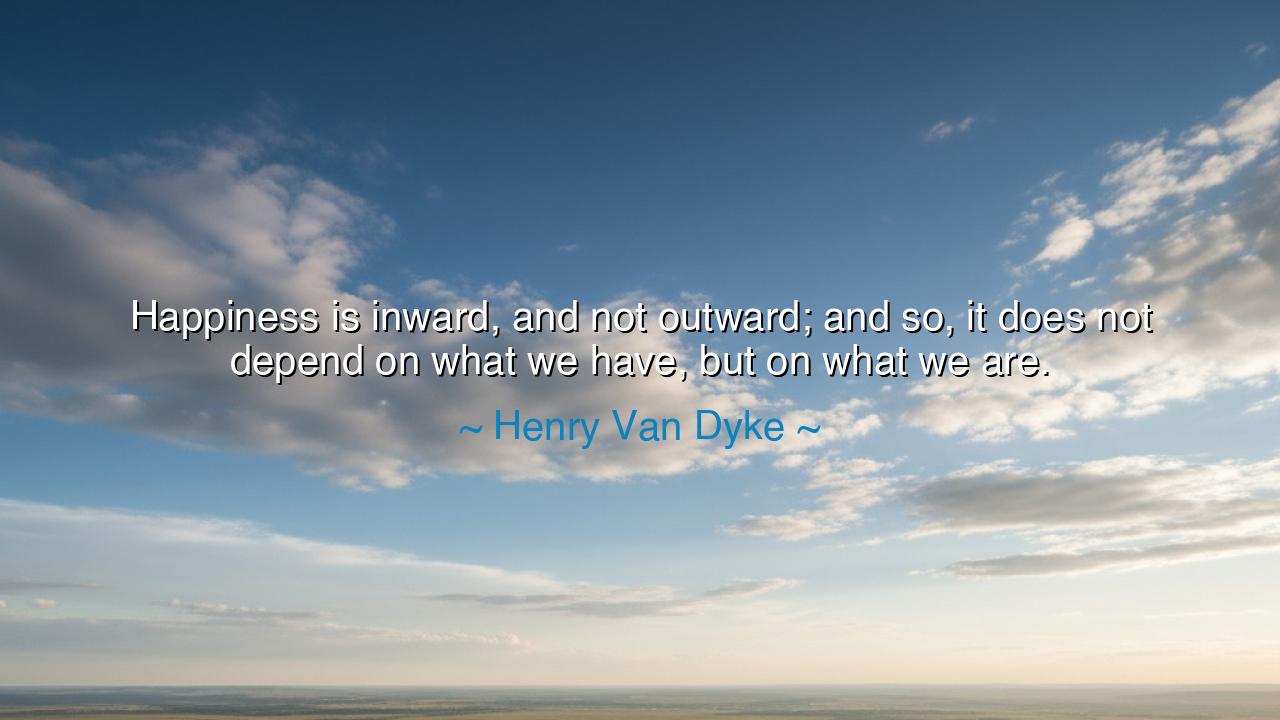
Happiness is inward, and not outward; and so, it does not depend
Happiness is inward, and not outward; and so, it does not depend on what we have, but on what we are.






"Happiness is inward, and not outward; and so, it does not depend on what we have, but on what we are." Thus spoke Henry Van Dyke, a poet, minister, and philosopher whose words still shine like a lamp against the restless hunger of the modern age. In this brief but eternal truth, he reveals the sacred nature of happiness—that it is not a jewel to be found in the hands, nor a crown bestowed by fortune, but a light that burns within the heart. The man who understands this is free, for he no longer chases joy like a shadow, but discovers it abiding quietly within his own being.
Van Dyke lived in an era of progress and material ambition, when nations measured greatness by wealth and men by possessions. Yet he saw clearly what so many had forgotten: that contentment cannot be purchased, and that peace does not come from what lies around us, but from what lives within us. His words echo the wisdom of the ancients, who taught that the soul is the true kingdom of man. To cultivate that inner realm—to fill it with virtue, gratitude, and love—is to dwell in joy even when the outer world withholds its favor.
To say that happiness is inward is to understand that it flows not from circumstances, but from character. The world may change—riches may fade, friends may depart, health may falter—but the man who is rich in spirit remains unshaken. His peace does not crumble because its roots run deep in what he is, not in what he has. This is why those who seek happiness in possessions, praise, or power often find themselves emptier the more they acquire. They build their joy upon shifting sand, and when the tide of life rises, all they have built washes away.
History is filled with those who proved this truth through their lives. Consider Viktor Frankl, the psychologist who endured the horrors of the concentration camps. Stripped of everything—family, freedom, even the right to live as he wished—he discovered that while others could take all he had, they could not touch who he was inside. In that terrible darkness, he found a light that no cruelty could extinguish: the freedom to choose his own attitude, the power to find meaning even in suffering. He had nothing, yet he possessed everything that mattered. Such is the triumph of the soul that knows happiness is inward.
The origin of Van Dyke’s thought lies not only in his faith, but in his keen understanding of human nature. As a man of both letters and the spirit, he saw that life’s greatest blessings come not from accumulation, but from cultivation—from tending the garden of one’s heart. He believed that when we strengthen our virtue, practice gratitude, and live with integrity, we create within ourselves a fountain of peace that flows through every season of life. This was the gospel of the inner life, a truth whispered by saints and poets alike: that we must build our happiness in the soul, where no thief can steal and no storm can destroy.
Yet this teaching demands courage. It asks us to turn inward—to face ourselves honestly, to let go of pride, envy, and fear, and to find peace not in what we desire, but in what we already are. It is easier to blame the world for our sorrow than to look within and see where we have failed to nurture contentment. But the wise know that life’s richest joy is found in simplicity: in loving without condition, in working with purpose, in being at peace with one’s own nature. The man who has learned this walks through life untroubled by circumstance, for his happiness is anchored in his being, not his belongings.
So, my children of tomorrow, remember the teaching of Henry Van Dyke: that the treasure you seek is already within you. Do not chase happiness through wealth, status, or applause, for these are but reflections that fade with the setting sun. Instead, cultivate the virtues of the soul—kindness, humility, gratitude, and courage—for these are the roots of joy that endure. Each morning, look not to what you lack, but to what you are, and ask, “What goodness can I grow within myself today?”
For when you learn to be content with who you are, and when your heart becomes a source of peace for others, you will find that you lack nothing. Then, even in poverty, you will be rich; even in solitude, you will be surrounded by light. For as Van Dyke reminds us, happiness does not depend on what we have—it depends on who we choose to be. And in that choosing lies the power to transform both the self and the world.






AAdministratorAdministrator
Welcome, honored guests. Please leave a comment, we will respond soon